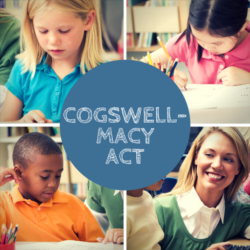The Situation:
Just under 10,000 children ages birth-21 are deafblind in the U.S.
“Deafblind” refers to combined hearing and vision loss, and these two senses can be reduced, distorted, or missing entirely.
Deafblindness is a disability of access to the visual and auditory information about people and things in the environment necessary for learning, communication, and development.
Children who are deafblind can learn and interact if given access to specialized educational programming and appropriate supports.
There is a critical shortage of early intervention and educational personnel with the knowledge and skills required to meet the unique, specialized needs of this population of children.
An estimated 80% of students with deafblindness are unemployed after graduation from high school. If education is our society’s ticket to employment and independence, then our current system has failed this group of students.
The Solution:
The Alice Cogswell and Anne Sullivan Macy Act would strengthen the Individuals With Disabilities Education Act (IDEA) and improve results for children and youth with deafblindness by ensuring that:
- Teachers and other educators are available who have the specialized knowledge and skills needed.
- Intervener services for students who are deafblind will be listed as a related service.
- States will engage in strategic planning to be sure that they can in fact meet each child’s specialized needs.
- Every child who is deafblind, regardless of whether they have additional disabilities, will be properly counted, evaluated, and served.

